Sparking Brilliance of Diamond:
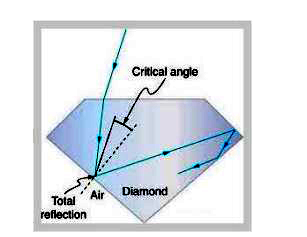
The total internal reflection of the light is used in polishing diamonds to create a sparking brilliance. By polishing the diamond with specific cuts, it is adjusted the most of the light rays approaching the surface are incident with an angle of incidence more than critical angle. Hence, they suffer multiple reflections and ultimately come out of diamond from the top. This gives the diamond a sparking brilliance.
The following diagram shows same diamond cut in two different shapes.
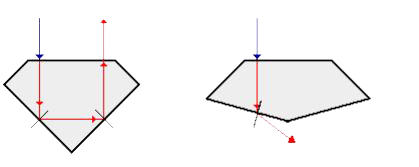
The brilliance of diamond in the second diamond will be:
less than the first.
greater than first.
same as first.
will depend on the intensity of light.
The correct Answer is:A
The brilliance of diamond in the in the second diamond will be less than the first since in the second, no total Internal reflection has taken place.
Similar Questions
Sparking Brilliance of Diamond:
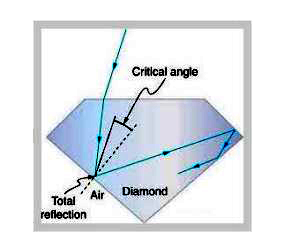
The total internal reflection of the light is used in polishing diamonds to create a sparking brilliance. By polishing the diamond with specific cuts, it is adjusted the most of the light rays approaching the surface are incident with an angle of incidence more than critical angle. Hence, they suffer multiple reflections and ultimately come out of diamond from the top. This gives the diamond a sparking brilliance.
The critical angle for a diamond is 24.4∘. Then its refractive index isView SolutionSparking Brilliance of Diamond:
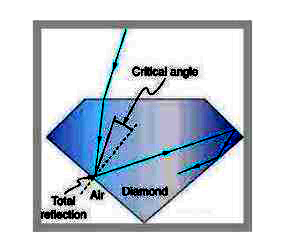
The total internal reflection of the light is used in polishing diamonds to create a sparking brilliance. By polishing the diamond with specific cuts, it is adjusted the most of the light rays approaching the surface are incident with an angle of incidence more than critical angle. Hence, they suffer multiple reflections and ultimately come out of diamond from the top. This gives the diamond a sparking brilliance.
The basic reason for the extraordinary sparkle of suitably cut diamond is thatView Solution
Knowledge Check
- Question 1 - Select One
The brilliance of diamond is due to
AReflection of lightBRefraction of lightCTotal internal reflection of lightDDiffraction of light - Question 2 - Select One
Brilliance of diamond is due to
Ashape.BcuttingCreflection.Dtotal internal reflection. - Question 3 - Select One
Brilliance of diamond is due to
AShapeBCuttingCReflectionDTotal internal reflection
Sparking Brilliance of Diamond:
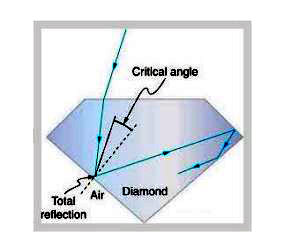
The total internal reflection of the light is used in polishing diamonds to create a sparking brilliance. By polishing the diamond with specific cuts, it is adjusted the most of the light rays approaching the surface are incident with an angle of incidence more than critical angle. Hence, they suffer multiple reflections and ultimately come out of diamond from the top. This gives the diamond a sparking brilliance.
Light cannot easily escape a diamond without multiple internal reflections. This is because:View SolutionSparking Brilliance of Diamond:
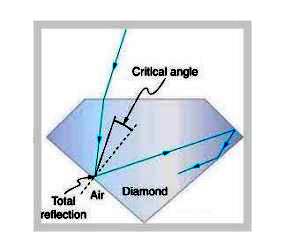
The total internal reflection of the light is used in polishing diamonds to create a sparking brilliance. By polishing the diamond with specific cuts, it is adjusted the most of the light rays approaching the surface are incident with an angle of incidence more than critical angle. Hence, they suffer multiple reflections and ultimately come out of diamond from the top. This gives the diamond a sparking brilliance.
A diamond is immersed in a liquid with a refractive index greater than water. Then the critical angle for total internal reflection willView SolutionDraw ray diagrams for incident rays at angle of incidence less than critical angle and more than critical angle?
View SolutionDuring total internal reflection, the energy of the incident light
View SolutionA ray of light travelling in water is incident on its surface open to air. The angle of incidence is θ, which is less than the critical angle. Then there will be
View Solution

